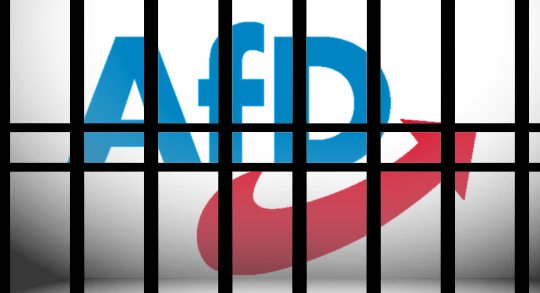
I posted last night about the case of a 16-year-old German girl named Loretta, who was pulled out of school by police after her principal reported her for obliquely supporting the AfD (Alternative für Deutschland, Alternative for Germany).
Neither the previous article nor the one below discuss what got Loretta in trouble. Here’s a reminder of what caused her to be arrested:
At the end of February, the girl was taken out of class in front of her fellow students and questioned by police, as first reported by German newspaper Junge Freiheit.
In her TikTok post, she asked “What do Germany and the Smurfs have in common: They are both blue.” The post was in reference to the AfD, which has blue party colors.
The appalling actions by the government of Mecklenburg-Western Pomerania have drawn international attention to the state. In response, the state government is attempting to do damage control by hiding all of its internal deliberations.
Many thanks to Hellequin GB for translating this article from Junge Freiheit. The translator’s comments are in square brackets:
Schwesig government keeps school instructions under lock and key
The “Loretta case” concerns the state parliament of Mecklenburg-Western Pomerania. New, explosive details have become known in a special meeting. The Union and AfD accuse Manuela Schwesig’s state government of a cover-up.
Schwerin
The state government of Mecklenburg-Western Pomerania, led by Manuela Schwesig (SPD), is keeping a memo under wraps in which school principals were informed about how supposedly extremist students should be dealt with. This was reported by the education policy spokesman for the AfD parliamentary group in the state parliament, Enrico Schult, following a special meeting of the education committee on the “Loretta case”.
“It is not helpful at all that the Ministry of Education is withholding ‘case scenarios’ sent to all school management, in a memo, on February 22, 2024, to which the headmaster referred and which are intended to clarify how to proceed in alleged cases of danger. Why exactly? Do these systems contain politically tinged requirements?” criticized Schult after the meeting.
He asked whether “the police should be called for every politically unpopular post.” “Or what happens when teachers accidentally come across critical posts in the media made by their students? Should they make a report?”
Criticism of the school principal and the state government
The AfD politician renewed his criticism of the behavior of the director of the Ribnitz-Damgartener Richard-Wossidlo-Gymnasium, who contacted the police at the end of February and had 16-year-old Loretta picked up from class after he was given screenshots of the 16-year-old’s social media appearances . These were not criminally relevant. Nevertheless, the officers carry out a “kind of threat address,” as they told Junge Freiheit.
“In response to the student’s posts, both the state government and the police, as well as the school principal, acted completely excessively and inappropriately. This caused damage to girls and the school atmosphere,” criticized the education politician.
It was “absolutely disproportionate” to call the police after he received an “anonymous email with denunciatory intent.” “The overly heavy-handed procedure points towards a motive to exploit state organs politically against those who think differently.”
School received a snitch email the day before the police operation
The CDU in the state parliament also expressed strong criticism. “The way in which the Ministry of the Interior and the Ministry of Education provide information on the topic is a pure transparency and communication disaster. I got the impression today that the ministries are doing this on purpose,” said the education policy spokesman for the CDU parliamentary group, Torsten Renz.
Important documents that the committee had requested “were largely not distributed to the committee members at all and in other parts only after several timeouts and consultations during today’s meeting,” complained Renz. “It is still unclear what options or guidelines exist for the headmaster — the exact decree is still not publicly known.” [I guess they are busy rewriting it so that the only sacrifice they’ll have to make is the school principal.]
It also became known that the notification email about Loretta reached the school the day before the operation. “It was not possible to say exactly when the headmaster actually took note of the email. It is also unclear to what extent the email was anonymized,” complained Renz.
Afterword from the translator:
In 1976 there was an “Overwhelming Ban” introduced. Which means that teachers must not impose their opinions upon the student and thus prevent him from making an independent judgment. This is exactly where the border between political education and indoctrination runs. “Indoctrination is incompatible with the role of the teacher in a democratic society and the — universally accepted — goal of the student’s maturity.” (Wehling 1977).
The three main-pillars are:
- Prohibition against overwhelming the pupil
- Treating controversial subjects as controversial
- Giving weight to the personal interests of pupils
I wonder when one can finally call these people “criminals” with impunity?

I’m sure there was a time when the accuser was required to appear in person before those whom they accuse.
It seems that in many Western countries those in authority have reverted to the practise of Star Chambers and Lettres de Cachet.
The DDR never died and went away, it moved west.